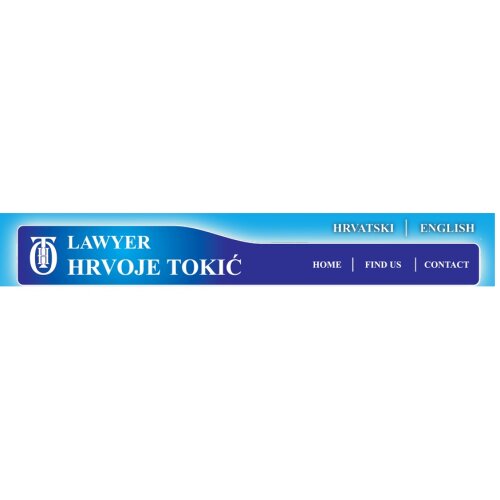Best Oil, Gas & Energy Lawyers in Croatia
Share your needs with us, get contacted by law firms.
Free. Takes 2 min.
Or refine your search by selecting a city:
List of the best lawyers in Croatia
About Oil, Gas & Energy Law in Croatia
The energy sector in Croatia, particularly oil and gas, plays a critical role in the country's economy. With Croatia being strategically positioned in Southeastern Europe, it serves as a significant conduit for energy supplies between the East and West. The discovery of oil and gas reserves, coupled with Croatia's shift towards renewable energy, has made it essential to regulate the exploration, production, and distribution processes. Croatia's energy laws aim to ensure sustainable energy supply, promote renewable energy sources, and integrate the country into the European Union’s energy market framework.
Why You May Need a Lawyer
Legal assistance in the field of oil, gas, and energy in Croatia may be essential for several reasons:
- Contract Negotiations: Engaging in agreements for exploration, production, and distribution of energy resources can be complex and requires expert legal insight.
- Regulatory Compliance: Adhering to local, national, and EU regulations for environmental standards and operational protocols.
- Dispute Resolution: Handling conflicts with partners, clients, or government entities can arise during the execution of energy projects.
- Licensing and Permits: Securing the necessary legal documents and permissions for exploration and development in Croatia.
- Renewable Energy Projects: Navigating the legal frameworks for investing in or developing clean energy initiatives.
Local Laws Overview
Several key laws and regulations govern the oil, gas, and energy sectors in Croatia:
- Energy Act: This law outlines the fundamental guidelines for efficient energy supply and usage, along with promoting sustainable energy initiatives.
- Hydrocarbons Exploration and Exploitation Act: Regulates the procedures for granting licenses, conducting exploration, and exploiting hydrocarbon resources.
- Environmental Protection Act: Establishes environmental standards that energy companies must adhere to, minimizing ecological impacts.
- Renewable Energy Sources and High-Efficiency Cogeneration Promotion Act: Supports the development and integration of renewable energy sources.
- Electricity Market Act: Governs market operations, including generation, distribution, and consumption of electricity in Croatia.
Frequently Asked Questions
What is the main regulatory body for energy in Croatia?
The Croatian Energy Regulatory Agency (HERA) is responsible for regulating and overseeing the country's energy sector.
How do I obtain a license for oil exploration in Croatia?
You need to apply to the Ministry of Economy and Sustainable Development, which oversees the issuance of licenses for oil and gas exploration.
What are the penalties for non-compliance with Croatian energy laws?
Penalties can range from fines to suspension of operational licenses, depending on the severity of the non-compliance.
Is investing in renewable energy encouraged in Croatia?
Yes, Croatia offers incentives for renewable energy projects to align with its EU obligations and environmental goals.
What does the Croatian government require for environmental assessments in energy projects?
Energy projects must comply with environmental impact assessment regulations to ensure minimal ecological disturbance.
Are foreign companies allowed to invest in Croatia's energy sector?
Yes, foreign investment is allowed and encouraged, with the appropriate legal frameworks in place.
What role does the EU play in Croatia's energy laws?
Croatia's energy regulations often align with EU directives to promote an integrated European energy market.
How is the electricity market structured in Croatia?
The Electricity Market Act provides a framework for the generation, distribution, and consumption of electricity within Croatia.
What kinds of disputes are common in the Croatian energy sector?
Common disputes involve contract disagreements, regulatory compliance issues, and environmental impact conflicts.
Can I switch energy providers easily in Croatia?
Yes, consumers can switch providers under the competitive market conditions established by energy market regulations.
Additional Resources
For individuals seeking further information related to the field of oil, gas, and energy in Croatia, the following resources can be helpful:
- Croatian Energy Regulatory Agency (HERA)
- Ministry of Economy and Sustainable Development
- Croatian Hydrocarbon Agency
- Chamber of Commerce: Energy Division
- European Union's Energy Regulatory Framework
Next Steps
If you require legal assistance in oil, gas, and energy in Croatia, consider the following steps:
- Identify your specific legal needs: Define the issue or service you need help with.
- Research reputable legal experts: Look for law firms or attorneys specializing in the energy sector.
- Consult with potential lawyers: Arrange consultations to discuss your needs and evaluate their expertise in energy law.
- Review fees and contracts: Understand the potential costs and contractual obligations before committing to legal representation.
- Utilize additional resources: Consider engaging with professional organizations or governmental bodies for further assistance and information.
Lawzana helps you find the best lawyers and law firms in Croatia through a curated and pre-screened list of qualified legal professionals. Our platform offers rankings and detailed profiles of attorneys and law firms, allowing you to compare based on practice areas, including Oil, Gas & Energy, experience, and client feedback.
Each profile includes a description of the firm's areas of practice, client reviews, team members and partners, year of establishment, spoken languages, office locations, contact information, social media presence, and any published articles or resources. Most firms on our platform speak English and are experienced in both local and international legal matters.
Get a quote from top-rated law firms in Croatia — quickly, securely, and without unnecessary hassle.
Disclaimer:
The information provided on this page is for general informational purposes only and does not constitute legal advice. While we strive to ensure the accuracy and relevance of the content, legal information may change over time, and interpretations of the law can vary. You should always consult with a qualified legal professional for advice specific to your situation.
We disclaim all liability for actions taken or not taken based on the content of this page. If you believe any information is incorrect or outdated, please contact us, and we will review and update it where appropriate.
Browse oil, gas & energy law firms by city in Croatia
Refine your search by selecting a city.

















